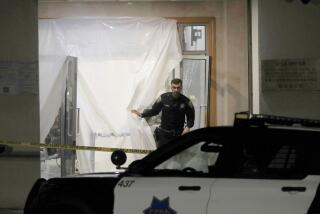Envoy Backed Turkey’s EU Bid
- Share via
ISTANBUL, Turkey — Over a candlelight dinner last summer, British Consul General Roger Short told a group of Western and Turkish businessmen, intellectuals and journalists that he worried that the spread of Islamic militancy in this predominantly Muslim country was not being taken seriously enough.
On Thursday, Short was among those killed in attacks on the British Consulate and a London-based bank here. Because of a recent fire, he was working in a makeshift office near the gate through which a truck bomb tore at 11 a.m. Short, who was fluent in Turkish, would have turned 59 on Dec. 9.
Short was an admirer of Kemal Ataturk, the soldier-turned-statesman who created the modern, secular republic of Turkey from the ashes of the Ottoman Empire in 1923. Short was a strong backer of Turkey’s effort to become the European Union’s first Muslim member and argued that EU membership was the best guarantee against the Islamic fundamentalist influences from Iran and Turkey’s Arab neighbors.
Short’s wife, Victoria, reportedly had stepped outside the consulate before the bomb went off. The blast created an inferno of smoke and shattered glass. She and daughter Catherine, visiting from Britain, were being consoled by the Rev. Ian Sherwood, the Anglican chaplain at their residence in Istanbul’s Besiktas district. “They are very, very broken,” Sherwood said.
The U.S. State Department has long regarded Turkey as a potential danger zone for its diplomats. The ambassador in Ankara, the capital, and the consul general in Istanbul travel in bulletproof cars, with security details.
After the 1991 Persian Gulf War, two American military contractors were killed and a U.S. Air Force officer wounded in an attack in Turkey that was blamed on a leftist group.
In July, the U.S. Consulate was moved from the center of Istanbul -- not far from where the bomb struck outside the British facility -- to a more secure location on the city’s northern edge. The new consulate, set on a barren hilltop, is a fortress-like structure, with slits for windows.
“One of the reasons for the decision to move the consulate was obviously security,” a U.S. official said. “And the new building meets security standards set out by Congress.”
The consulate issued a new warning to U.S. citizens after the attacks Thursday. Americans were cautioned to keep low profiles and stay away from shopping centers and Western businesses. A similar warning was issued by Britain’s Foreign Office for its citizens.
Roads leading to the U.S. and British embassies in Ankara were blocked to traffic after the attacks. The American and British schools in Istanbul were closed indefinitely.
British diplomats here may well be thinking it is all too little too late, said a Western diplomat, who spoke on condition of anonymity. “And they may well be asking, ‘Why?’ ” Unlike the Americans, they had not been moved to a safer place, he said.
Short earned undergraduate and master’s degrees in literature and humanities at Oxford University. He served with the Foreign Office and was posted to Ankara from 1967 to 1978.
He returned to Ankara as head of chancery from 1981 to 1984. After a stint in London, he went to Oslo as consul general.
Short also served as ambassador to Bulgaria from 1994 to 1998, then went to Sarajevo in the Office of the High Representative, where he oversaw peace-building efforts in Bosnia-Herzegovina.
He had been consul general in Istanbul since 2001.
Short is survived by his wife and three children.
*
Times staff writer Janet Stobart in London contributed to this report.
More to Read
Sign up for Essential California
The most important California stories and recommendations in your inbox every morning.
You may occasionally receive promotional content from the Los Angeles Times.











